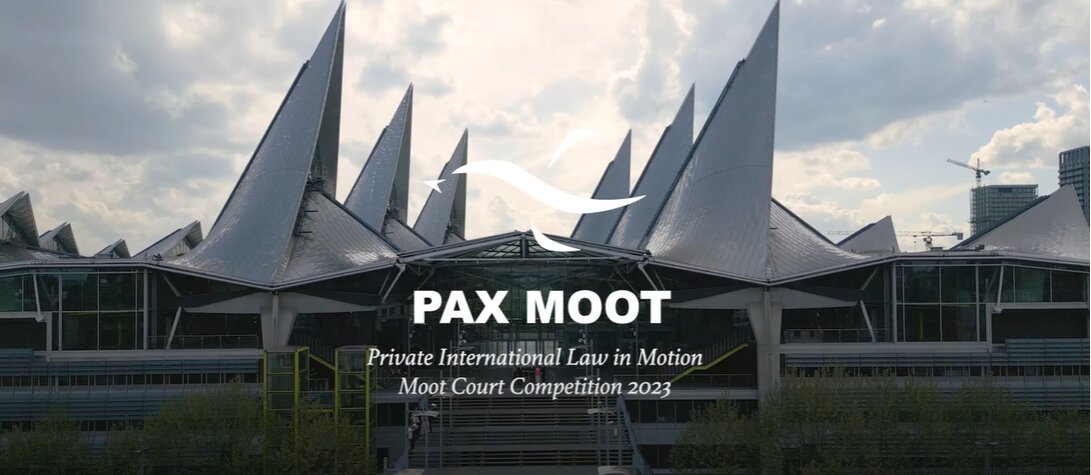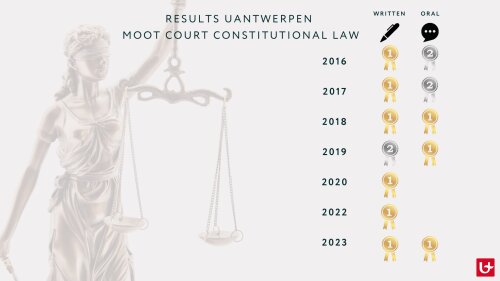Moot Court Competitions
(inter)national moot court competitions
Moot courts
Each year, students from the Faculty of Law take part in various (inter)national moot courts.
Moot courts are a great opportunity for students to develop research, communication and legal advocacy skills. They also allow for interactive teamwork, and network connections with experts, professionals and students from other law schools. Stellar performing students in these international moot courts have gone ahead to work for top law firms in Belgium and abroad or continued their education in top ranked universities.
If you would like to take part in a Moot Court, contact professor Dirk Vanheule.
Discover what it's like to participate in a moot court
PAX Moot Court 2023

Recent wins
2024-2025
- The UAntwerp Faculty of Law team won the second prize and the prize for the Best Memorandum at the Belgian Moot Court Grondwettelijk Recht / Droit Constitutionnel. One of the 2025 UAntwerp team members, Anahit Miskarian, also won the prize for best pleader in the preliminary rounds.
2023-2024
- The UAntwerp Faculty of Law team won the second prize and the prize for the Best Memorandum at the Belgian Moot Court Grondwettelijk Recht / Droit Constitutionnel.
- The UAntwerp Faculty of Law Team won the Prize for Best Written Pleadings at the Herbert Smith Freehills Competition Law Moot Court held at at King’s College London. A member of our team, Jan Zbin, was also commended for his excellent advocacy during the oral rounds in London on 14-15 June.
- The UAntwerp Faculty of Law team won the award for the second best memorial during the Belgian National Rounds of the Philip C. Jessup International Law Moot Court Competition at the White and Case law firm in Brussels and was selected for the international rounds in Washington D.C. from 30 March until 6 April 2024. The team's memorial was also ranked 18th (out of 143) at the international rounds in Washington D.C.
2022-2023
- The UAntwerp Faculty of Law team won the best team prize and the prize for the best written piece at the Belgian Moot Court Grondwettelijk Recht / Droit Constitutionnel. One of the 2023 UAntwerp team members, Eva Devlieghere, also won the prize for best pleader.
2021-2022
- The UAntwerp Faculty of Law team won the 2022 International Migration and Refugee Law Moot Court Competition.
- The UAntwerp Faculty of Law team won the written rounds of the Belgian Moot Court Grondwettelijk Recht / Droit Constitutionnel.
- The UAntwerp Faculty of Law team made it to the final round of the Helga Pedersen Moot Court Competition/ELSA Human Rights Moot Court Competition in Strasbourg and was the team with the highest score in the preliminaries. Two of our students (Thomas Naenen and Simon Dael) won the prize of best requesting party of the preliminaries in Kiev.
2020-2021
- The UAntwerp Faculty of Law team made it to the final round of the Helga Pedersen Moot Court Competition/ELSA Human Rights Moot Court Competition in Strasbourg and finished 2nd out of 88 participating teams. One of our students (Thomas Swennen) was proclaimed best pleader of the final and semi-final round.
For the academic year 2025/26, students will have an opportunity to participate in the following (inter)national moot courts.
The Helga Pedersen Moot Court Competition (HPMCC)
- Subject: European Human Rights Law
- Team composition: 2-4 students
- Format: Written round and oral rounds in two parts: regional rounds and final rounds
- Timeline: Problem release in September, Written arguments submission in December, regional rounds in different cities in Europe, and final round of 18 in Strasbourg, France in the spring.
The Helga Pedersen Moot Court is organised annually by the European Law Student Association (ELSA). It simulates procedures of a complaint before the European Court of Human Rights (ECtHR). The moot court has attracted over 80 law schools from Europe and other countries.
Past topics included freedom of expression online, responsibility for climate change, and freedom of assembly and association. It was formerly known as the ELSA Human Rights Moot Court Competition.
The Philip C. Jessup International Law Moot Court (The Jessup)
- Subject: Public International Law (Volkenrecht)
- Team composition: 2-5 students
- Format: Written rounds and oral rounds in two parts: National rounds and International rounds
- Timeline: Topics released April; Problem released in mid-September.
Written arguments (memorials) submission in January, National Rounds (Brussels, White and Case law firm) in March, and International Rounds in Washington DC, USA, in April.
The Jessup is the world’s oldest and largest moot court on Public International Law. It is organised annually by the International Law Student Association (ILSA). Jessup teams present oral and written arguments on a fictitious dispute in simulated case before the International Court of Justice.
Past topics have included the responsibility of states in a global pandemic, foreign election interference, and nuclear disarmament obligations.
The 2023 Jessup problem will address the interpretation of a peace treaty, deadly attacks in allegedly occupied territory, unilateral economic sanctions, and the legal consequences of failing to dispose of hazardous waste properly.
For any questions/queries about participation, you can contact jessup@uantwerpen.be
The PAX Moot Competition (PAX)
- Subject : Private international law
- Team composition : 2-4
- Format : Written and Oral rounds. Oral rounds in Paris, France
- Timeline: Problem released in November, Oral rounds in May
The PAX Moot Competition is a specialised moot court focussing on Transnational Law and Private International Law issues. In this competition, participants will be able to learn and apply first-hand the complexities and nuances of how international Conventions and EU Regulations interact in the context of globalization. Without pleading on the merits of the case, PAX Moot participants will be given a case geared towards private international law questions (jurisdictional, choice of law or recognition and enforcement issues).
Belgian Moot Court Grondwettelijk Recht / Droit Constitutionnel
- Subject: National, Belgian, constitutional law
- Team composition: 3 students
- Credits: 9 ECTS
- Language: Dutch and/or French
- Content guidance: Prof. Cedric Jenart and graduate teaching & research assistant Marta Łotoczuk
- Format: Written and Oral rounds. Oral rounds in Brussels, Belgium
- Timeline: Problem released beginning of February. Deadline written beginning of March. Oral rounds end of April.
You defend, together with your two teammates, the colours and honour of the University of Antwerp and its Faculty of Law by competing in a moot court against teams from the nine other Belgian Faculties of Law.
The Moot Court consists of a written phase and an oral phase that takes place in the courtrooms of the Council of State. The judges normally consist of the first president of the Council of State, a former vice-president of the European Court of Human Rights and other respected magistrates, lawyers and jurists.
The fictional case is usually inspired by an existing case for the Constitutional Court. A legal norm is thus potentially in conflict with the Constitution or the rules governing the division of powers. The procedure may arise as a result of a preliminary question or in the context of an action for annulment. The fictitious case concerns both institutional constitutional law and human rights.
There are interesting prizes to be won for the best pleader, the best pleading and the best oral argument.
Results
In the eight years of the moot court competition's existence, the UAntwerp team has already won the written round six (!) times, reached the final five times and won the entire moot court competition three times. You can find an overview of our wins in the following image.
Are you going to continue this tradition?


If I were to describe my moot court participation, I would say it was an enriching experience. I would definitely participate again!
- Eva Devlieghere, member of the winning team of the Belgian Moot Court Competition Grondwettelijk Recht / Droit Constitutionnel 2023